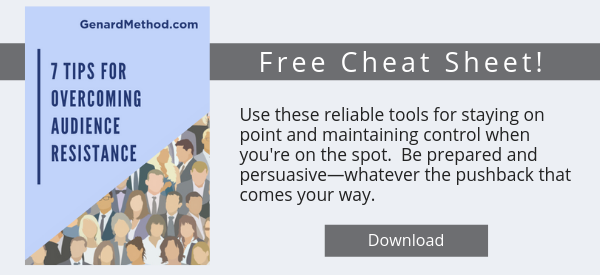
If you browse Dr. Marc Schoen's book Your Survival Instinct Is Killing You, you'll come across this quote of Charles Darwin's:
"It is not the strongest of the species that survives, nor the most intelligent that survives. It is the one that is the most adaptable to change."
The Darwin Correspondence Project, including an associate editor of the early volumes of The Correspondence of Charles Darwin, claims that these words "never flowed from [Darwin's] pen" (http://www.darwinproject.ac.uk/six-things-darwin-never-said. Accessed 27 March 2013.)
Whether they did or not, the quotation is too delectable in regard to public speaking fear to pass up. For adapting to speaking-induced anxiety is not only necessary for survival as a public speaker (or as an everyday business presenter). It's also the key to becoming a comfortable, confident, and credible speaker. Roll up those three "C" words into one and you get another word that takes you down a notch while boosting your speaking success.
That word is "influence," as in "you will be a more influential speaker." Here are 4 characteristics of an influential speaker to help get you there.
It Ain't About You
How can taking you down a notch increase your speaking success? Easy: get rid of that capital "I" and you'll take a giant step, through a lowercase "i" toward the goal you're really aiming for in public speaking: "influence".
It starts with a simple but powerful realization: the reason you're giving a speech, presentation, sales talk, lecture, update at a meeting or any other spoken performance is to offer something of value to listeners. You are never the important entity in the room—your audience is.
In fact, extreme self-concern while presenting is guaranteed to reduce your influence, because you'll be buying into an impossibility: the attempt to influence others when your attention is focused on yourself. When I work with clients to help reduce their fear of public speaking, I remind them that they're being narcissistic.
That's not because they're egomaniacs, but it's simply due to the extreme discomfort they're experiencing. Try thinking of something else when you have a toothache and you'll understand how you can be lulled into self-focus when you'd rather be thinking about almost anything else. In the case of public speaking, of course, that something else is your message and getting it across to the audience.
Enhancing Your Performance
So how can you overcome this "focus deficit," adapt to your public speaking fear, and even enhance your performance? In two ways: by recognizing the true nature of public speaking anxiety, and learning how to harness the energy that's sending you off in the wrong direction.
Fear of public speaking, you see, is a misplaced response. It's not as though you need to come to grips with this fear and thrive in spite of it. The truth is, you're better off by recognizing that there isn't any fearful situation to begin with!
In terms of evolution (you knew we'd get back to Darwin, didn't you?), we are all programmed appropriately to react to truly fearful events in advantageous ways. You probably recognize this reaction as the "flight or flight" response: when faced with true danger, our body prepares itself to fight the threat (if we can do so) or to flee from it (if it's too great for us to face).
So what your body experiences during public speaking fear would be an entirely appropriate reaction . . . if there were truly a dangerous situation in front of you. But there isn't, since most audiences you face won't be holding spears ready to hurl at you if you forget one of your talking points.
The solution? Recognize that the anxiety you're feeling isn't a response to danger at all, but is instead a form of social anxiety. You improve your anxious feelings about people by getting better at dealing with people. That's why one of my mantras to my speech clients is: Spend less time preparing your content, and more time learning how to be comfortable talking to groups of people. Do that, and you'll be dealing with the true cause of your speaking fear and helping to lessen it. To learn how to enhance your relationship with listeners, read my cheat sheet, "5 Ways to Captivate an Audience."
Use That Energy!
The second way you can enhance your speaking performance is by harnessing the energy that arises as a result of speech nervousness. The proverbial butterflies in the stomach and other low-level activation in the face of public speaking is a beneficial effect. You need to become more activated so that you're "psyched for the big game," and ready to go rock and roll.
Too strong a focus on the danger you're facing, however, over-activates you. And you've already learned not to accept the DANGER signal flashing in your mind, because true danger doesn't exist. Now take the next step and use the extreme activation that often accompanies speaking fear.
Feel like you gotta move? Then move! Use the stage that's rightfully yours as a speaker, whether it's a raised platform, front of the hotel ballroom, or even your place at the conference table. Never sit when you can stand as a presenter. It will not only help you use up that excess energy, but will make you more dynamic to watch, and allow you to amplify your message with gestures. Here are some body language secrets you should know to be a more effective presenter.
Move purposefully, not aimlessly: step to a different spot for each talking point, approach a listener who's asked a question, cross to the screen to point out something on a slide. The more you move, the less you'll feel trapped in the pressure cooker of your anxiety. (One of the situations that puts you in the pressure cooker is putting together a presentation when you have no time! Discover a safety valve in my cheat sheet, "How to Prepare a Speech in 15 Minutes.")
Your performance will truly be enhanced. And you'll validate Darwin's famous remark that "Successful public speakers always know how to adapt," whether he actually said it or not.
Key takeaways from this blog:
- To gain the influence you're looking for, remove the "I" from your talks.
- If you're focused on yourself, you won't be able to influence others.
- Public speaking fear is a misplaced response. It's really social anxiety.
- Spend less time on content and more time being comfortable with people.
- Harness your nervous energy and move to appear more dynamic!



